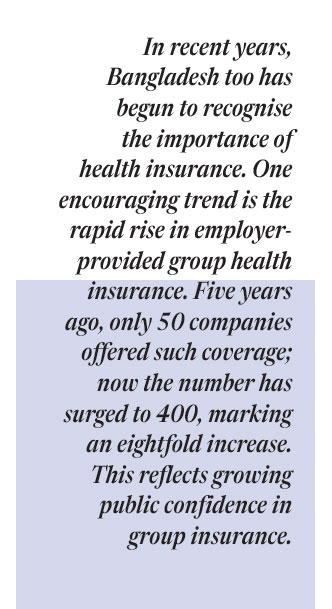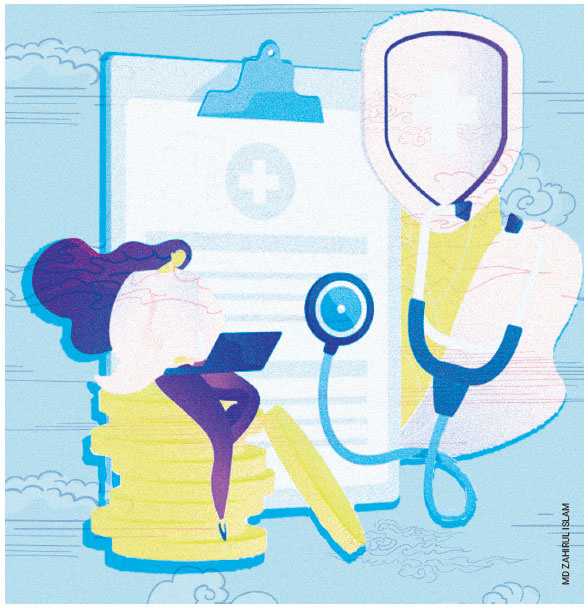
SHAKHAWAT HOSSAIN SUMON
Medical emergencies rarely come with a warning. In Bangladesh, when illness or injury strikes, it brings not only physical suffering but also a heavy financial blow. A 2022 study by the Bangladesh Institute of Development Studies (BIDS) found that around 6.1 million people in the country fell below the poverty line after paying for medical expenses.
Another World Bank report revealed that Bangladeshi households pay 74% of all healthcare costs directly from their own pockets. A single serious illness or accident can undo years of effort, leaving families trapped in debt and despair.
Despite this alarming situation, health insurance coverage remains extremely low. The main reasons are limited financial literacy and lack of  awareness. Most people neither understand how insurance works nor realise the crucial role it plays in protecting their savings. The realisation often comes only during a crisis – by which time it’s too late.
awareness. Most people neither understand how insurance works nor realise the crucial role it plays in protecting their savings. The realisation often comes only during a crisis – by which time it’s too late.
By contrast, neighbouring countries such as India and Thailand have made notable progress in health coverage. In India, the health insurance sector grew by 17.8% in 2023, driven by rising medical costs, greater awareness of lifestyle diseases, and the growth of digital insurance platforms. Thailand’s life insurance penetration stood at 3.4% in 2021, but since 2002, its 66.3 million citizens have benefited from Universal Health Care (UHC), reducing the financial strain on individuals.
In recent years, Bangladesh too has begun to recognise the importance of health insurance. One encouraging trend is the rapid rise in employer-provided group health insurance. Five years ago, only 50 companies offered such coverage; now the number has surged to 400, marking an eightfold increase. This reflects growing public confidence in group insurance.
In addition, the Health Sector Reform Commission has recommended a mandatory social health insurance programme for formal-sector workers to reduce the financial impact of medical emergencies.
As one of Bangladesh’s most forward-looking insurers, Guardian Life Insurance is playing a leading role in making health coverage more accessible.
The company’s Guardian Cancer Care provides comprehensive protection against cancer, including flexible coverage and premium waivers after diagnosis.
Similarly, Guardian Cardiac Care addresses cardiovascular disease – the country’s leading cause of death – through accessible, paperless coverage starting at just Tk225.

For everyday risks, Guardian Accidental Care offers protection against accidental death and disability for as little as Tk10 per day. Collectively, these plans make essential health protection more inclusive and within reach of ordinary citizens.
“These health insurance products represent real progress towards making healthcare affordable for ordinary Bangladeshi families,” said Sheikh Rakibul Karim, CEO of Guardian Life Insurance, in an interview with The Daily Sun.
“By using digital technology, removing unnecessary paperwork, and keeping premiums low, Guardian and similar innovators are making insurance accessible to everyone, not just the wealthy.”
For the insurance sector to grow further, Sheikh Rakibul Karim stressed the need for better financial education, simpler premium payment systems, supportive government policies, and continued digital infrastructure development.
An industry insider observed, “Medical emergencies are unpredictable, but financial security doesn’t have to be. Health insurance can act as a shield against unexpected medical expenses. While some people benefit from company-provided plans, the vast majority remain without coverage.”
In a country where healthcare costs can destroy financial stability overnight, affordable digital insurance is no longer a luxury – it is fast becoming a necessity.
________________________________
Shakhawat Hossain Sumon is a Senior Reporter at the Daily Sun.
Email: [email protected]

